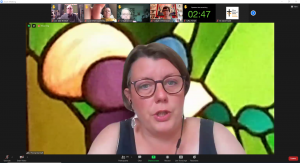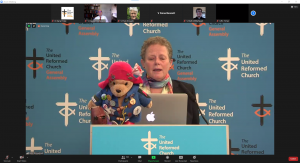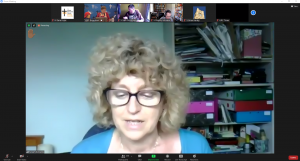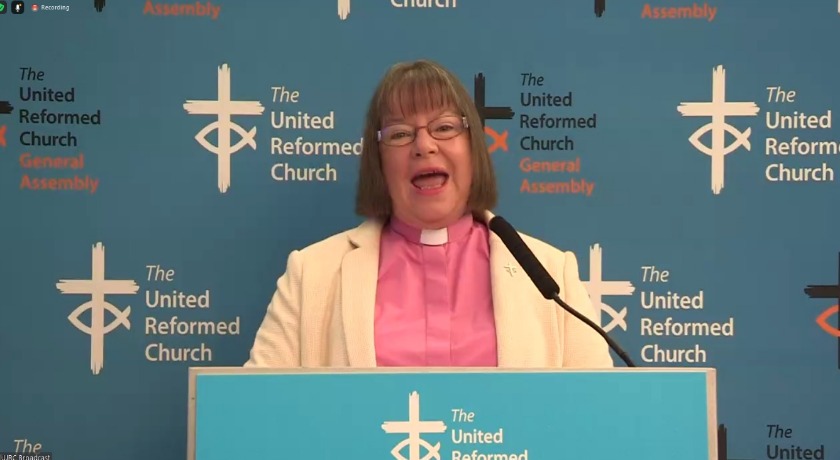The third day of the United Reformed Church General Assembly, which was held digitally, began with prayer led by the Chaplain to the Moderators, the Revd Helen Everard.
Session nine
Announcement of the Election of General Assembly Moderator 2022-2023
The result of the vote for Moderator of General Assembly was announced by the Revd Adrian Bulley, Convenor Business Committee: 208 votes were cast and the Revd Fiona Bennett, Minister of Augustine United Church, Edinburgh, was elected as Moderator. Mrs Everard led Assembly in prayer for both candidates.
 Ms Bennett will address the Assembly in its last session, on Monday.
Ms Bennett will address the Assembly in its last session, on Monday.
Mission Council Report
John Bradbury presented the report from the Mission Council, which is now known as the Assembly Executive.
Mission Council oversees, prepares and sifts business between meetings of the General Assembly. It tries to keep a proper focus on the Church’s main concerns, so that all its work will further the mission of the gospel.
It also carries delegated power to deal on Assembly’s behalf with matters that require prompt attention of business at Assembly may enable Assembly ‘to take a more comprehensive view of the activity and policy of the Church’.
In order for Mission Council to be alert to the needs, concerns, opportunities and hopes of the whole body of the URC, people from the synods of the Church make up most of its membership.
The report was accepted by the General Assembly.
Session ten
 Sunday Morning Worship
Sunday Morning Worship
General Assembly’s worship on Sunday morning was led by the Revd Helen Everard, Chaplain to the Moderators. She was accompanied by Paddington Bear, who, she explained, has been making a pilgrimage across Wessex Synod.
The Revd Paul Robinson led Assembly in the hymn ‘The Kingdom of God is justice and joy’, and the Woking URC led ‘All through history’.
‘Most villains prefer’, written especially for Assembly by the Revd John Campbell, was sung by Flynn Everard and other members of the Everard family.
Jemima White read the story of King Herod and John the Baptist from Mark 6, with illustrations and models by Daniel Clarke.
The Revd Clare Downing, Moderator of General Assembly, preached. Connecting the reading with the theme of ‘heroes and villains’, Ms Downing noted that heroism and villainy are not always easy to judge. Although John the Baptist is God’s spokesperson, he is disappointed in Jesus when he does not follow in his challenging ways. Herod seems to be a villain, and yet respects and listens to John. Even when it comes to Salome and Herodias, we do not have enough information to judge.
This Gospel reading, Ms Downing said, is “a reminder of the complexity of being human”. Similarly, this evening’s England match may lead to some players being cast as either heroes or villains, with no allowance for middle ground, though the truth will be more mixed.
The story raises the question of who we listen to, she said. Herod had to choose between John and Herodias, and we are surrounded by voices too. “Listening for the right voices – for God’s voice amongst the tumult – is not always easy, but is vital in our discipleship.”
Another question raised by the story is how we use whatever power we have. “Within the life of the church, we are to build one another up, to encourage each other, to work for the good of the whole world.”
Ms Downing concluded: “We may never be superheroes, but the call to be disciples should lead us to a place where we listen for God’s voice and exercise the power we have wisely and for the good of all, and where our deepest desires will be for the flourishing of the rule and mission of God.”
The closing hymn was ‘Eternal God, your love’s tremendous glory’ sung by Paul Robinson.
Session eleven
Ministerial Disciplinary Process and Incapacity Procedure
In Resolution 39, General Assembly adopted a large number of amendments to the Basis of Union and Structure of the URC, the procedure for dealing with cases of incapacity involving ministers and Church Related Community Workers (CRCWs), related panels and appointments to panels and commissions, and training to those bodies.
The paper was presented by Dr Janet Tollington and Dr Augur Pearce, members of MIND, the Ministerial Incapacity and Discipline Advisory Group.
In May 2019, Mission Council approved the preparation of a new process for dealing with cases of discipline involving Ministers and Church Related Community Workers. It directed MIND to proceed with the redrafting.
The first version of the Framework, the backbone of the new process, was seen by Mission Council at the May 2019. Since then, the Framework and Appendices have been reviewed by scrutiny groups, volunteer members of Mission Council and individuals with relevant experience from outside MIND, the Safeguarding Advisory Group, the Legal Adviser, Mission Council again, the Synod Moderators’ Meeting and the Ministries Committee.
The final version of the Framework and Appendices accompanied the report to the General Assembly.
Section O is broken beyond repair, Dr Tollington started, and has been revised many times. For example, there is no reference to safeguarding.
The sanctions and appeals of the process remain, but the new process is easy to understand.
There will be investigation teams to open proceedings to ensure that the complaint needs to go to the next stage of the process, and those who are appointed to those teams will remain, to ensure continuity of skills and expertise. “It’s not a life sentence,” Dr Tollington said. “These changes, if adopted, will benefit Ministers, complainants and the local church.”
The procedures will also be easier to amend in the future.
Augur Pearce asked the Assembly to trust the scrutiny that the changes had gone through over the past three years. And at times, costs will be reduced. The changes will also bring the processes and available disciplinary options closer together.
The incapacity procedure was also changed to reflect the changes made in the disciplinary process.
The Clerk and Mr Pearce told Scott Wheeler said that not all arrests and charges may lead to a disciplinary process, e.g. when ministers were arrested following a protest. If a minister is arrested then they should report that to their Synod Moderator, who will then decide how to respond.
Resolution 39 was carried.
Andrew Atkinson asked about the appropriateness of ministers cross examining complainants and witnesses. Dr Pearce said that alternative methods of cross examinations were available in the policy.
Jenny Mills and Megan Westgarth asked for additional visual leaning resources to be created to explain the process. Dr Pearce said that the current one would be updated and then shared to go alongside the process.
Rosalind Selby asked about financial support for those who are accused. There is no provision at the investigation stage, Dr Pearce explained, then the accused minister and investigation team to the assembly commission for costs to be met from church funds, for example for representation and expert witnesses.
Resolutions 40 and 41 were carried.
The General Secretary and the Clerk of the Assembly asked Assembly to accept an amended resolution which clarified a requirement about the appointments to panels by Synods.
After Dr Bradbury answered a question from David Turner asked about the appointments process, the resolution was carried.
Resolution 43 about the training for those serving on panels could be started in three or four weeks, Dr Tollington explained.
Judy Harris asked if Safeguarding could be involved with that training. The need to interact with safeguarding had been part of the development of the training, Dr Tollington explained, but safeguarding was part of this new process.
The General Secretary then moved resolution 39 be referred to Synods.
Resolution 5 – New Induction promises for Elders
General Assembly gave final approval in Resolution 5 to add a further question to Schedule B (of the Basis of Union) with immediate effect for Elders to answer:
Q: Do you promise as an Elder of the United Reformed Church to seek its well-being, unity and peace, to cherish love towards all other churches and to endeavour always so far as you are able to build up the one, holy, catholic and apostolic Church?
A: By the grace of God I do, and all these things I profess and promise in the power of the Holy Spirit.
Session twelve
URC Children and the future of Pilots
 Sam Richards, Head of Children’s and Youth Work, presented ‘Children and Church’, a video in which children talked about their experiences of the past year, including what they missed about going to church during lockdown and how they continued to take part in it in other ways.
Sam Richards, Head of Children’s and Youth Work, presented ‘Children and Church’, a video in which children talked about their experiences of the past year, including what they missed about going to church during lockdown and how they continued to take part in it in other ways.
One child said: “It was definitely a lot harder, but never at one point did I feel I was not part of the church family.”
Members then split into groups to discuss what the children had said and how to support them. Dr Richards invited members of Assembly to give her direct feedback.
After another video, in which children talked about what they most liked about Pilots, the United Reformed Church children’s programme, the Revd Paul Robinson, Convenor of the Children’s and Youth Work Committee, presented Assembly with a series of resolutions on the future of children’s work.
He said that the proposals grew out of conversations that were full of ‘deep and growing appreciation for the good work that happens in local churches through Pilots, both now and in the past.’
He recognised the difficulties that children’s work had faced during lockdown. The proposals he brought before Assembly, he said, also reflected the declining number of Pilots companies and the wide range of good children’s work more generally in local United Reformed churches, which he said reached almost 30,000 children.
The resolutions propose creating a new umbrella, URC Children, to support all URC children’s work, no longer just focused on Pilots, to be launched at General Assembly in 2022.
Members of Assembly expressed warm appreciation of Pilots, and after a short discussion the resolutions were passed.
Paper B2: URC Committees and online meetings
Reuben Watt, URC Youth General Assembly Moderator, presented Paper B2 which highlighted that the number of people being able to fill roles on committees and attend meetings would be greatly improved if more meetings were held online.
Reuben expressed gratitude for the many contributions to General Assembly particularly by those aged under 26. But referring to the Nominations report, he noted, disappointingly, that since August 2020, only one person aged under 26 and no one aged 26 to 45 has accepted a nomination to join one of the URC committees.
He explained that the reason for this may be because most meetings take place in the middle of the afternoon, often in London; times and places that are inconvenient for many with work and study commitments.
Reuben said a culture shift was needed in the way the URC hosts and carries out meetings. Thanking the Equalities for its support, the Youth Moderator clarified that that the aim of the resolutions was not just aimed at making meetings more accessible for those aged under 26 but reducing the environmental impact that travelling to meetings can cause.
He said: “I really do believe that these resolutions will make a positive impact on our committees both at Assembly level, Synod level and church level.”
Comments in the information stage of the proceedings centred on the consultation process as some committees, colleges and synods holding meetings with young people were already holding such meetings online.
Reuben praised these efforts and asked them to continue and perhaps go even further, by directing attention to resolution 11 which encourages committee meetings and tasks groups to move onto holding 50% of meetings online.
Reuben also reminded General Assembly that the resolution was not just about being able to facilitate young people, but all those who find the status quo restrictive.
Regarding Resolution 11, concerns were raised about: the timing of meetings and the fact that they are often arranged by committee/task group members. A suggestion was made that, in order to prevent becoming too restrictive, a policy be made that the secretary and convenor of a committee/task group make it a point to review the timing of meetings when new people join; the impact and expectations on employees, particularly Church House staff who take minutes of meetings/task groups. They would suddenly be expected to work outside of their normal working hours without consultation; being able to sense the mood of the room and the Holy Spirit’s guidance not being as easy to judge online as it is in person; and the moderating and technical supporting of online meetings adequately.
The URC’s Legal Adviser reminded General Assembly to be wary of discussion and setting resolutions that involved aspects of changes to employees working hours as these were set in contracts, changes to which would need consultation. Reuben reminded General Assembly that resolution 11 was a request not an instruction.
Resolution 10 and 11 were carried with 12 being remaindered.
Resolutions 20 and 21 – URC Future Pensions
Assembly dealt with the remaindered business of Resolutions 20 and Resolution 21.
Following a question about timing by Ruth Whitehead, John Bradbury explained that the future of the pension funds relate to how the Church deals with the £45m deficit in the existing funds, something which is dependent on these resolutions.
Some Synod Trusts are happy to make a contribution to the gaps in the pension funds but would only do that as charitable trustees when a decision in principle has been taken to close this fund by the Assembly.
A delay could also impact the pensions of ministers, and attract questions from charity regulators.
Having set out the expectations of the fund, and making good provision for ministers, the Church needs to take this decision in principle, and there is also a wider question of stewardship, Dr Bradbury said.
After this, Ruth Whitehead and Romilly Micklem moved that the resolution Be Now Put.
In summing up, John Piper, URC Deputy Treasurer, said he had identified positive and negative reasons for the resolutions.
Nothing can change without the agreement of the General Assembly; concerns have been listened to; delays could cost £1.5 – 2m per year; changing the schemes would not stop the church from doing its best to care; we should trust those who will continue this work who, with God’s help, will continue this care; and trust us now not to propose changes that aren’t beneficial.
We could face accusations from churches that the pensions schemes no longer represent value for money, Mr Piper continued, and the Church budget for 2022, to be agreed in November by the Assembly Executive, could be drastically affected.
Resolution 20 was put and carried.
After some further clarifications and a request for consultation with trade unions, Resolution 21 was carried.

